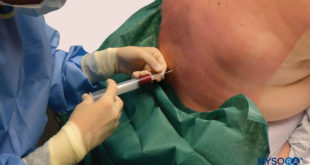Are you about to have surgery? Getting anxious about your procedure? Here are the five questions to ask your anesthesiologist before “going under” anesthesia.
What’s the anesthesia model you are using?
Most people are unaware that in the United States there are several ways of providing anesthesia care. The original model involves an anesthesiologist (a physician specifically trained in anesthesiology) that personally performs your anesthetic from beginning to end. These physicians have gone through extensive training before being able to call themselves anesthesiologists: 4 years of college, 4 years of medical school, and 4 years of residency training.
The second model, which has gained popularity in the US, is the anesthesia care team model. In this model, an anesthesiologist supervises 2 to 4 CRNA’s (2 to 4 different surgeries at a time) that perform your anesthetic. Your own surgery may be just one of the four that this particular anesthesiologist is responsible for at that given time. The CRNA stays with you throughout your procedure, with the anesthesiologist available for critical parts of the case and as needed.
A CRNA is a certified registered nurse anesthetist. The requirements are a 4 year bachelors degree in nursing, one year of ICU experience as a nurse, and completion of a 2 year nurse anesthesia program. In the care team model, the CRNA stays with you from beginning to end, with the anesthesiologist present at key parts of the case and available should the CRNA need help.
There’s a third model if you have your surgery done at an academic medical center. Because these institutions have residency programs and also function as teaching institutions, you may have an anesthesiology resident (a physician still completing their specialty training) or an SRNA (student nurse anesthetist) involved in your care. Again, there is a supervising anesthesiologist that may be covering several OR’s. In certain higher risk or more complex cases, the anesthesiologist may be assigned to just one operating room and may have a trainee as an assistant.
As a part of your informed consent, it is important that you understand the role and experience level of all anesthesia providers involved in your care. If you are unclear, ask those interviewing you prior to your case exactly what are their qualifications and what kind of model will be used in your case. If you prefer one model over another, it is within your right to make a request.
Importantly, a CRNA will often introduce himself / herself to a patient as an anesthetist, not a nurse anesthetist. This can be confusing to patients, because they often will not know what an “anesthetist” is and assume the person is an anesthesiologist. But you will know!

***Tip:Talk to your surgeon beforehand and ask him/her what the anesthesia coverage will be like.
Training/ Board Certification
As I mentioned above, your anesthesiologist has gone through extensive training: 4 years of college (at least, right), 4 years of medical school, and 4 years of residency training. Additionally, they must pass two rigorous exams in order to become board-certified by the American Board of Anesthesiology (www.theABA.org).
The first is a written exam that is administered within the first few months of completing residency. Here’s a flavor of the types of topics that are fair game for these exams: disease processes affecting a range of patients from neonates (little babies) to the elderly, physiology, pharmacology, ACLS (advanced cardiac life support), the physics of anesthesia gases and anesthesia machines, anesthesia plans for complicated surgeries, etc. It’s a tough exam, and it should be.
Once the written exam is passed, one can schedule the oral exam. Among other things, this test hones a candidates knowledge, judgement, adaptability, and communication skills. Only after both these exams are passed is an anesthesiologist said to be board certified.
If you know your anesthesiologist’s name, you can check to see if he/she is board certified by visiting www.theABA.org. Click on the “Who’s certified” tab in the left side bar. On the following page, fill in their full name and press “search”.
***Note: It may take a year or so from the time residency is completed to become board certified. During this time, your anesthesiologist is said to be “board eligible”. This does not mean necessarily that there’s anything “suspect” about your anesthesiologist. Just that he/she is in the process of becoming board-certified.
Do you have experience with this type of case?
If you are still worried after going through the first two questions, you can ask your anesthesiologist what experience he/she has with the type of surgery you are about to have. Some surgeries are more common than others.
This question may be especially helpful if you are about to undergo a very complicated or rare procedure. In that case, you may want to know how many of these surgeries your surgeon has performed. Also, you’ll want to find out how many of these procedures are done at that particular hospital. Things have a higher chance of going smoothly if the hospital and your entire health care team have significant experience with your procedure.
What’s the anesthesia plan?
Once your anesthesiologist has braved the above gauntlet and has performed their pre-operative history and physical exam, it’s time to discuss the anesthesia plan. This may involve general anesthesia or some form of sedation. It may also involve a regional anesthetic (nerve block) or a neuraxial technique (epidural or spinal anesthetic). At times, more than one form of anesthesia may be combined to achieve the best effect.
Your anesthesiologist will discuss every type of anesthetic that is in the plan for you and answer all your questions. They will give you the reasons for selecting the various anesthetics for your case. Ultimately, it is your choice. After hearing the risks, benefits, and alternatives you may choose certain techniques from the menu that your anesthesiologist has provided.
My advice, however, is to listen carefully to their reasons for selecting a specific anesthesia plan for you. Your anesthesiologist likely has quite a bit of experience taking patients safely through that surgical experience.
Ask as many questions as you like, and utilize their expertise.
Did you get a good night’s rest?
I have had several patients ask me some variation of this very question. As a part of my professionalism, I make it a habit to get plenty of rest the night before I am scheduled to work. This is just common sense.
Obviously, there are times when emergency surgeries must be performed in the middle of the night. That is why doctors are “on call”, and it’s an important part of the service we provide to our patients and the community. However, if you are coming in for an elective procedure, you can ask your anesthesiologist how they are doing, what kind of rest they have gotten, and get a general feeling for their state of mind.
The motto of our specialty is “vigilance”. Being well rested certainly plays a part to help ensure that we are living up to this creed.
Conclusion
We hope that you have found this guide helpful. And we pray that you, or your loved one, has a safe and positive surgical experience. If you’d like to get more great information on anesthesia topics, please visit the home page. If you’d like to get in touch with us for any reason, please use the contact page.
Dr. Dave & Dr. Joe

 Anesthesia Myths: Get the Facts, Lose the Fear | Your #1 Anesthesia Resource in Simple language
Anesthesia Myths: Get the Facts, Lose the Fear | Your #1 Anesthesia Resource in Simple language



